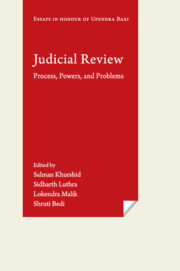Book contents
- Frontmatter
- Contents
- Foreword
- Editors' Note
- Introduction
- 1 The Inadequacy of Judicial Enforcement of Constitutional Rights Provisions to Rectify Economic Inequality, and the Inevitability of the Attempt
- 2 The Interplay of Law and Politics in India
- 3 Beating the Backlog: Reforms in Administration of Justice in India
- 4 Judicial Review: Perspectives and Reflections for the Twenty-First Century
- 5 When ‘Creeping Jurisdiction’ Goes Awry: The Social Action Litigation to Ban Surrogacy
- 6 Judicial Review and the Democratic Judge
- 7 Judicial Review: A Tool to Shape Constitutional Jurisprudence
- 8 The Baxian Bioscope on Indian Judicial Process
- 9 Judicial Activism, Courts, and Constitutional Revolutions: The Israeli Case
- 10 Democracy, Constitution, and Judicial Review: A Critique
- 11 A Minor Jurisprudence of Pathos: Upendra Baxi as Teacher and Writer
- 12 The Need for Reinventing the Supreme Court as a Constitutional Court
- 13 Appointment of ‘Distinguished Jurists’ as Judges in the Supreme Court of India: A Critical Analysis
- 14 Judicial Dissent and Judicial Review: A Functional Analysis
- 15 The Power of Judicial Review: Judicial Chutzpah or Judicial Desideratum
- 16 Judicial Review of Legislations by Tribunals in India: Law, Problems, and Perspectives
- 17 Criminalization of Membership of Terrorist Organizations in India and the United States of America: Human Rights Concerns
- 18 Article 142 of the Indian Constitution: On the Thin Line between Judicial Activism and Restraint
- 19 Sketching the Limits of Article 142 of the Constitution of India: A Constitutional Necessity
- 20 Constitutional Morality and Judges of the Supreme Court
- About the Contributors
- Index
10 - Democracy, Constitution, and Judicial Review: A Critique
Published online by Cambridge University Press: 23 January 2020
- Frontmatter
- Contents
- Foreword
- Editors' Note
- Introduction
- 1 The Inadequacy of Judicial Enforcement of Constitutional Rights Provisions to Rectify Economic Inequality, and the Inevitability of the Attempt
- 2 The Interplay of Law and Politics in India
- 3 Beating the Backlog: Reforms in Administration of Justice in India
- 4 Judicial Review: Perspectives and Reflections for the Twenty-First Century
- 5 When ‘Creeping Jurisdiction’ Goes Awry: The Social Action Litigation to Ban Surrogacy
- 6 Judicial Review and the Democratic Judge
- 7 Judicial Review: A Tool to Shape Constitutional Jurisprudence
- 8 The Baxian Bioscope on Indian Judicial Process
- 9 Judicial Activism, Courts, and Constitutional Revolutions: The Israeli Case
- 10 Democracy, Constitution, and Judicial Review: A Critique
- 11 A Minor Jurisprudence of Pathos: Upendra Baxi as Teacher and Writer
- 12 The Need for Reinventing the Supreme Court as a Constitutional Court
- 13 Appointment of ‘Distinguished Jurists’ as Judges in the Supreme Court of India: A Critical Analysis
- 14 Judicial Dissent and Judicial Review: A Functional Analysis
- 15 The Power of Judicial Review: Judicial Chutzpah or Judicial Desideratum
- 16 Judicial Review of Legislations by Tribunals in India: Law, Problems, and Perspectives
- 17 Criminalization of Membership of Terrorist Organizations in India and the United States of America: Human Rights Concerns
- 18 Article 142 of the Indian Constitution: On the Thin Line between Judicial Activism and Restraint
- 19 Sketching the Limits of Article 142 of the Constitution of India: A Constitutional Necessity
- 20 Constitutional Morality and Judges of the Supreme Court
- About the Contributors
- Index
Summary
Professor Upendra Baxi has written in his book The Crisis of Indian Legal System, published way back in 1982, that ‘the idea that legal rules are binding on all sections of society has been rejected in practice by the governing elite of the country’. He was at pains to explore and reflect that ‘modern India seems to have at least two parallel legal systems: one for the rich and resourceful and those who wield political power and influence and the other for small men without resources and capabilities to obtain justice or fight injustice’. The present crisis in the Supreme Court of India seem to be the crisis for ‘wielding power’ for ‘rich and resourceful’ and not delivering justice to small men of this country. This chapter, which is dedicated to the tallest legal legend of our times, explores what our forefathers wanted by ‘adopting, enacting and giving to our self’ the Constitution of India and what we are doing with it.
Introduction
‘It is emphatically the duty of the judicial department to say what the law is. Those who apply the rule to particular cases must, of necessity, expound and interpret the rule. If two laws conflict with each other, the Court must decide on the operation of each’, ruled Chief Justice Marshall in Marbury v. Madison and established the principle of judicial review—a principle of far-reaching consequences, which had no mention in the written Constitution of the United States of America. Ever since then, a lot of water has flown under the bridge, and the judicial department of the government has become very strong all over the world, especially in India, but not without controversy. It is expected that the laws, in a democratic country like India, would be framed by ‘we the people’ through their representative seating in the legislative chamber of the government. Of course, these laws ought to be within the framework of the Constitution of India and for the welfare and good governance of the country. However, occasions came when the legislatures kept in mind their personal interest or political interest while enacting the laws, and the preambular goals were given a go-by. This trend was wisely checked by the apex court through its judicial craftsmanship and introducing the theory of basic structure.
- Type
- Chapter
- Information
- Judicial Review , pp. 188 - 201Publisher: Cambridge University PressPrint publication year: 2020



